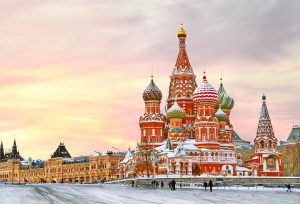Latest news about Bitcoin and all cryptocurrencies. Your daily crypto news habit.

The Central Bank of Russia has proposed classifying cryptocurrencies including bitcoin as digital goods for tax purposes, according to local publications. The draft proposal is due in one month.
Also read: Russia Considers Recognizing Bitcoin in 2018 to Fight Money Laundering
Classifying Bitcoins as Digital Goods
The Deputy Governor of the Central Bank of Russia, Olga Skorobogatova, revealed on Thursday that the bank has proposed to classify cryptocurrencies, including bitcoin, as digital goods for tax purposes. Sputnik International reported her saying:
Two months ago we held a meeting with ministries and organizations… on how to classify non-state cryptocurrencies, which are de facto used in Russia. We propose to treat them as digital goods, use the digital goods legislation, with certain amendments on taxes, control and record-keeping.
According to Skorobogatova, the proposal was supported by all ministries, and the central bank is planning to deliver the first draft of the regulations in a month. This proposal follows her promise in February for the central bank to decide whether digital currencies are considered assets, cash or securities by mid-2017.
The Central Bank’s Need to Control Bitcoin
According to RBC, a leading Russian media group headquartered in Moscow, the central bank claims that they need to start controlling cryptocurrencies in Russia or they can quickly become a threat.
Since digital currencies are not backed by gold reserves and are not state controlled, the deputy governor said that they can lead to instability in the financial markets sooner or later.
She then noted that cryptocurrency trading volumes in Russia have increased since last year, and said (loosely translated):
If people are engaged in this, they have to pay money for it. And we must understand how to control these activities.
Russia’s Struggle to Control Cryptocurrencies
The official government stance on cryptocurrencies has been under constant debate for years. Starting with a very strict stance favoring criminalization, Russian lawmakers have become more lenient over time as the benefits of blockchain technology became apparent in the country.
In December 2016, Vadim Kaluhov, the Director of Financial Technology, Projects and Process Management at the Bank of Russia, warned the government against using excessive measures. He conveyed that if the regulations are too strict, then cryptocurrency transactions will move outside of Russia. “By pushing the process of exchange out of the country, we actually lower the level of security and stability,” he detailed.
In January, Deputy Finance Minister Alexey Moiseev told reporters that the central bank and the Federal Financial Monitoring Service had been watching bitcoin. They did not find it to be a threat. In April, he announced that the country was considering recognizing the digital currency in 2018 to fight money laundering.
This month, the largest online retailer in Russia, Ulmart, announced that it will start accepting bitcoin payments in September.
Meanwhile, trading volume has grown steadily. Localbitcoins, the most popular trading platform in Russia, shows that the country has the second largest trading volume, behind only China. Russia has seen over 400 million rubles worth of trading, or over $7 million USD in weekly volumes for three weeks in a row.
What do you think of Russia classifying bitcoin as digital goods? Let us know in the comments section below.
Images courtesy of Shutterstock, RBC Group, Euronext, Coin.dance
Need to calculate your bitcoin holdings? Check our tools section.
The post Russia’s Central Bank Drafting Proposal to Classify Bitcoins as Digital Goods appeared first on Bitcoin News.
Disclaimer
The views and opinions expressed in this article are solely those of the authors and do not reflect the views of Bitcoin Insider. Every investment and trading move involves risk - this is especially true for cryptocurrencies given their volatility. We strongly advise our readers to conduct their own research when making a decision.


